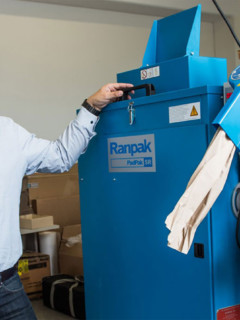The order has been placed in the online shop, the parcel is supposed to arrive the very next day, and the anticipation of the delivery is correspondingly great. All the more annoying then: despite notice and presence, no delivery takes place. According to “Post-Ärger.de”, this scenario is the main source of annoyance for consumers (41.4 per cent). Generally long delivery times (11.2 percent) and the loss of the shipment (9.6 percent) also lead to frustration among customers.
Complaints on the rise
With the increasing parcel volume in Germany, the number of complaints about parcel service managers is also growing: the complaint rate for lost parcels was 6 percent in 2016, and in 2017 it was already 8 percent. The choice of parcel service therefore plays an important role for customer satisfaction and the customer experience.For obvious reasons, parcel service providers do not peddle the figures on lost shipments and damaged parcels. Therefore, the consumer centres have made it their business to keep detailed records of customer complaints. They do this on the online portal Post-Ärger.de. This serves as a reporting centre for complaints.
Parcel complaints: Mainly in the city states
The figures show that this is necessary: a total of 8,846 parcel complaints were received in the period July 2018 to December 2018. Measured by the respective population size, most complaints come from the city states: For every 100,000 inhabitants, there are 34.5 complaints in Berlin, 30.09 in Hamburg and 15.6 in Bremen.
DHL tops the complaint hit list. At first glance, this is hardly surprising, since the company, which belongs to Deutsche Post, is the top dog in the parcel market with a market share of 57 percent. However, the complaint rate is significantly higher. 71.9 percent of all customer complaints concern DHL. However, the number of complaints only refers to the consumer market (B2C and C2C sector). The quality of parcel shipping between companies is not recorded.
This is how much it costs to send a parcel in Germany
Shipping costs are also a decisive factor for online retailers. If you look at large shops like Zalando or Amazon’s Prime offer, you can only assume that customers are not very willing to pay high postage costs. The 2018 Shipping Price Index has examined the shipping costs of a 2-kilo package with express delivery by the service providers DHL, UPS, Fedex and local providers in different countries. European comparison shows that Germany is in third place with shipping costs averaging 20.90 €. Only in the Netherlands with 24.45 € and France with 23.23 € are the average costs even higher. The cheapest shipping is in Romania with € 3.20.
At DHL, the prices for private customers within Germany are staggered according to weight. The parcel must not exceed a standard size of 120 cm x 60 cm x 60 cm. Anything larger and heavier than 31.5 kilograms falls under the category Bulky goods and will be priced differently. The prices refer to express delivery.
| Weight | Online price |
| Up to 500 g | 10,90 € |
| Up to 1 kg | 11,90 € |
| Up to 2 kg | 13,90 € |
| Up to 5 kg | 19,90 € |
| Up to 10 kg | 24,90 € |
| Up to 20 kg | 29,90 € |
| Until 31,5 kg | 44,90 € |
This is how much it costs to send parcels to other European countries
If the delivery is not made within Germany but to neighbouring France, for example, the prices increase many times over:
| Weight | Online price |
| Up to 500 g | 47,90 € |
| Up to 1 kg | 59,90 € |
| Up to 2 kg | 72,90 € |
| Up to 5 kg | 103,90 € |
| Up to 10 kg | 154,90 € |
| Up to 20 kg | 228,90 € |
| Up to 31,5 kg | 299,90 € |
For Business customers the price depends on the number of parcels sent annually: As the number of parcels increases, the shipping costs per parcel decrease – both nationally and internationally.
Careful selection of the parcel service
Given the comparatively high costs in Germany, you should choose your parcel service carefully. But not only with regard to the price, but also taking into account shipping time and reliability, both of which have become important purchasing criteria. Choosing the right parcel service is a key factor for success: not the cheapest service should be chosen, but the parcel service that offers the most advantages overall. Depending on the region, it is worth choosing a different provider, because delivery in villages and small towns is, according to parcelLab increasingly difficult: in rural areas DHL has three times as many delivery problems as in conurbations, other providers even five times more. But not only the region, but also the delivery day is crucial. Delivery should take place before Saturday, as delivery problems occur nine times more often on this day of the week than on other working days.
How to find the right shipping service provider
In addition to the decision criterion of price, you must essentially ask yourself the same questions as the recipient, orientate yourself on the experiences you have made yourself as a private customer. After all, in the end it is the recipient who must be satisfied. In addition to your own experience as a private customer, it is helpful to look at reviews.
Depending on the type of goods to be shipped, the weighting of the selection criteria is slightly different. Carefulness plays a different role for sensitive products such as flat-screen TVs or dental equipment than for items of clothing in a plastic bag. Delivery speed, tracking and flexible delivery options, on the other hand, are actually always an issue – and for the shipper: the price!
For example, from 200 parcels a year you can benefit from the business customer advantages of the parcel service provider DHL, from 300 parcels a year you are considered a “frequent shipper” and from 20,000 parcels Hermes offers special online retailer conditions. But there is also room for manoeuvre in between.
Criteria for choosing the right shipping service provider
So the old adage applies: “It depends!”. The best solution is usually found in conversation. It is best to arrange appointments with the respective sales representatives. During the conversation, your needs will be quickly analysed and an individual offer can be made based on the following criteria.
Criteria for choosing the right service provider
Regularly or sporadically?
Shipment weight and size?
Internationally?
Who are the recipients? Private households, parcel shops…
Special handling?
Requested delivery?
Tracking?
Success factor for your business: customer satisfaction
No matter which parcel service you choose to transport products from A to B – the highest priority is customer satisfaction. After all, a bad delivery experience always reflects on the online shop, even if the responsibility lies with the parcel service. If problems occur repeatedly, you should at least think about switching to another provider.
One solution that some of our customers offer their customers: In the check-out process, the customer is asked which delivery service he would like to have his order delivered with. The advantages are obvious: because the perception of the quality and reliability of the various delivery services not only varies regionally, as described above, but also depends on the customer’s own circumstances, preferences and experiences. Offering the customer a choice on this point is a great service factor. The disadvantage: you have to negotiate with several deliverers – and then only for a part of your order volume at a time. This can drive up the costs for transport and delivery.
Appreciation in parcel delivery must increase
But: Rising order numbers mean an almost Unacceptable workload for the parcel carrier. By 2021, the German Parcel and Express Logistics Association (BIEK) predicts a Increase to 4.15 billion parcels predicted. This is extremely stressful for the delivery staff. In the meantime, however, customers are also annoyed to the max, as evidenced by the number of complaints received (see above). Although, according to a study by Pitney Bowes, free delivery is still more important than fast delivery for 82 percent of Germans, rising dissatisfaction with the quality of delivery, increasing delivery traffic and, last but not least, becoming aware of the working conditions under which deliveries are made, are slowly causing a rethink. The Chairman of the Board of the German Parcel and Express Logistics Association (BIEK), Gerster, welcomes this:
“The appreciation and also the prices in parcel delivery must increase,” says Gerster in an interview with Die Welt.
Perhaps a start is to offer the customer different delivery services, also for an extra charge. And thus giving him back a certain responsibility:
















